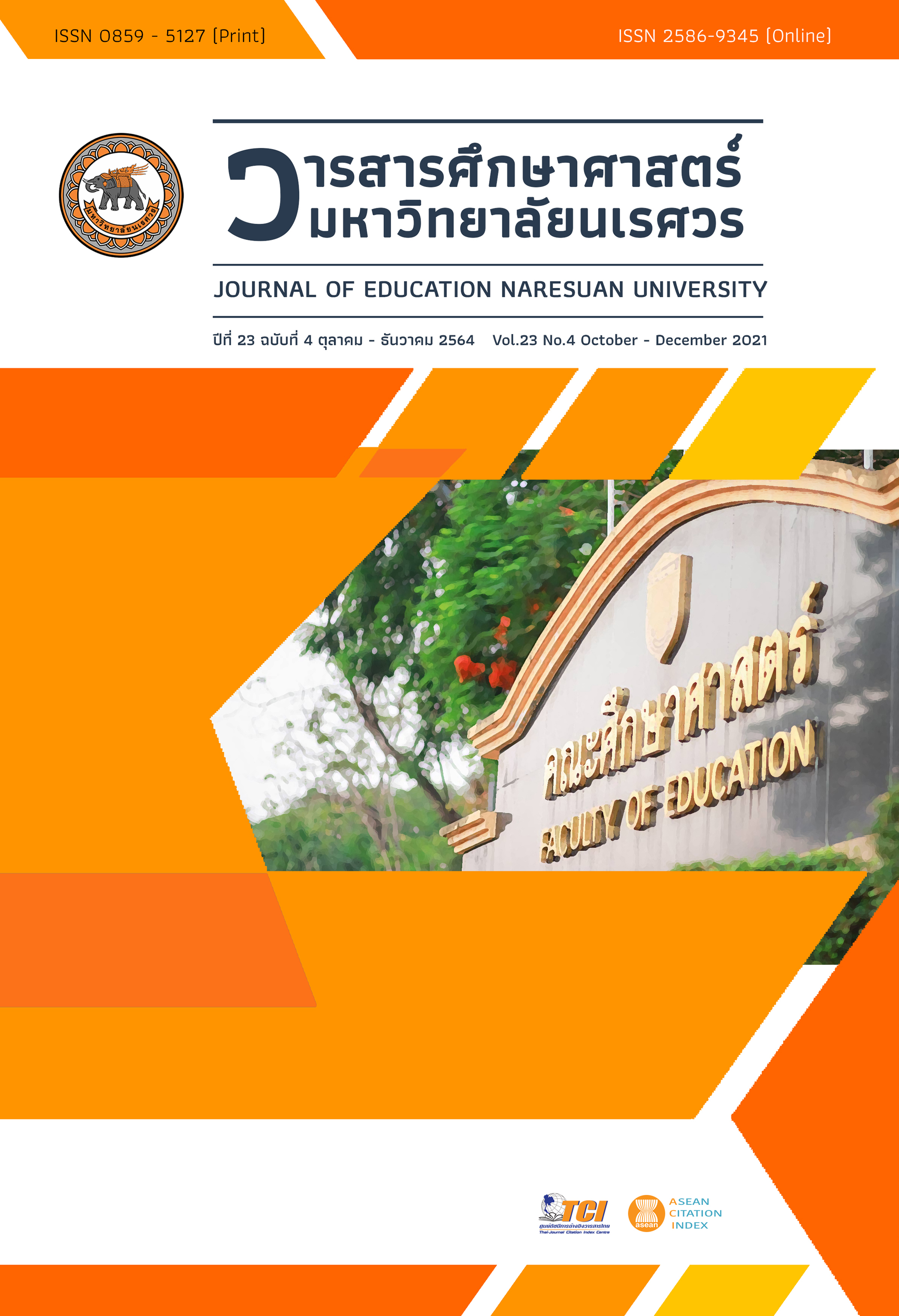FACTORS AND INDICATORS OF ACADEMIC ADMINISTRATION EFFECTIVENESS OF SOUTHERN RAJABHAT UNIVERSITY องค์ประกอบและตัวบ่งชี้ประสิทธิผลการบริหารงานวิชาการ ของมหาวิทยาลัยราชภัฏในภาคใต้
Main Article Content
Abstract
This research aim was to synthesis the indicators and factors of academic administration effectiveness of Southern Rajabhat University. The samples were professors of 5 in Southern Rajabhat Universities, include: 1) Phuket Rajabhat University, 2) Surat Thani Rajabhat University, 3) Nakhon Si Thammarat Rajabhat University, 4) Songkhla Rajabhat University, and 5) Yala Rajabhat University. The sample were 510 lectures by using. Use multi-step random sampling. The research instrument was questionnaire created by the researcher from the literature review. The validity test using IOC values from 5 experts. Find the reliability of the questionnaire by Cronbach,s alpha reliability coefficient. The reliability of the whole, equal to .967. The data was analyzed by exploratory factor analysis. The method of rotating the axis of the orthonic axis by the Varimax method. To search for factors and indicators of academic administration effectiveness of Southern Rajabhat University.
The result revealed that: The factors and indicators of academic administration effectiveness of Southern Rajabhat Universities consisted of 5 factors 42 indicators, ere; 1) morals, ethics and performance of graduates, there was 14 indicators, 2) skills achievement in the 21st century there are 11 indicators, 3) achievement according to curriculum standards there are 6 indicators, 4) teachers' satisfaction in work there are 8 indicators, and 5) transferring knowledge in the field there are 3 indicators.
Article Details
The owner of the article does not copy or violate any of its copyright. If any copyright infringement occurs or prosecution, in any case, the Editorial Board is not involved in all the rights to the owner of the article to be performed.
References
Anannavi, P. (2014). Principles and concepts of educational administration theory (5th ed.). Chonburi: Montri Print. [in Thai]
Ariya, K., Kaewurai, W., & Chaisanit, P. (2016). A development of an instructional model based-on differentiated instruction approach to enhance the ability of learning management design of 21st century for student teachers, Rajabhat University. Journal of Lampang Rajabhat University, 5(2), 1-17. [in Thai]
Blau, G. (1999). Early-career job factors influencing the professional commitment of medical technologist. Academy of Management Journal, 42(6), 687-696.
Buranadechachai, S. (2015). Characteristics of the graduates of the ASEAN community according to the needs of the executives in the eastern industrial estate. Journal of Interdisciplinary Research: Graduate Studies, 4(3), 15-26. [in Thai]
Chomkai, P., Singlop, S., & Thongsorn, P. (2018). The curriculum development of competency based on attributes of students hand-on Rajamangala University of Technology Tawan-ok. Journal of Education Naresuan University, 28(2), 189-200. [in Thai]
Cooper, A. M. (1958). How to supervise people. New York: McGraw - Hill.
Costello, A. B., & Osborne, J. W. (2005). Best practices in exploratory factor analysis: Four recommendations for getting the most from your analysis. Practical Assessment, Research, and Evaluation, 10, Article 7. DOI: https://doi.org/10.7275/jyj1-4868.
Cronbach, L. J. (1951). Essentials of psychological testing (3rd ed.). New York: Harper & Row.
Dosch, M. V. (2011). The course fit Us: Differentiated instruction in the college classroom (Doctoral dissertation). Grand Forks, ND: University of North Dakota.
Hair, F. J., Black, W. C., Babin, B. J., & Anderson, R. E. (2010). Multivariate data analysis (7th ed.). New Jersey: Person Education.
Herzberg, F., Mausner, B., & Snyderman, B. B. (1993). The motivation to work. New Brunswick: Transaction Publishers.
Manogharan M. W., Thivaharan T., & Rahman R. A., (2018). Academic staff retention in private higher education institute - case study of private colleges in Kuala Lumpur. International Journal of Higher Education, 7(3), 52-78.
Office of the Basic Education Commission. (2007). Basic school administration manual that is a legal entity. Bangkok: Ministry of Education. [in Thai]
Panich, W. (2012). 21st Century Learning Path for Disciples (4th ed.). Bangkok: Tathata Publication. [in Thai]
Pornwisai, C. (2013). The relationship between the behavior of school administrators and Job satisfaction of teachers under the Department of Education and Sports Udomsai Province Lao People's Democratic Republic (Master thesis). Maha Sarakham: Mahasarakham University. [in Thai]
Rathanit, S. (2017). Principles of educational management theory and practice (4th ed.). Bangkok: Pimdeekarnpim. [in Thai]
Sriyabhaya, W., Raksa, K., & Silrux, K. (2010). The needs of entrepreneurs to characteristics of graduates in language and communication. Chophayom Journal, 21, 36-50. [in Thai]
Tawong, L. (2015). The development of academic management factors affecting the learning achievement of student in lower secondary school. Journal of Education Mahasarakham University, 9(special), 648-664. [in Thai]
Thongphukdee, L., et al. (2009). Assessment of employer/entrepreneur satisfaction/graduate users with the characteristics of graduates Nakhon Ratchasima Rajabhat University Academic Year 2006-2007. Nakhon Ratchasima: Nakhon Ratchasima Rajabhat University. [in Thai]
Wonganutaroj, P. (2010). Academic administration. Bangkok: Supplementary Media Center Bangkok. [in Thai]
Wongpanarak, N., Khamenkan, K., Chaichan, A., & Aryamuang, S. (2011). The satisfaction of the supervisors in undergraduate program, Faculty of Nursing Mahasarakham University and learning outcome. Journal of Science and Technology Mahasarakham University, 10(Special), 308-321. [in Thai]


